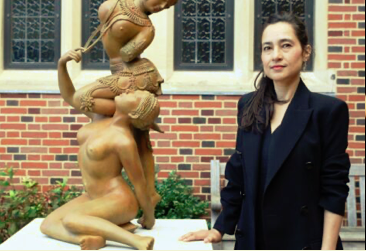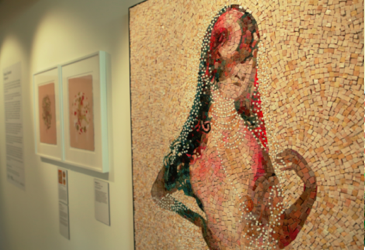South Asian artist's exhibition at Cambridge University explores intimacy and decolonisation
Over the course of her career, Sikander has been a pioneer in the study of early modern archives of Islamic and South Asian manuscripts for her contemporary practice.
Given its legacy of colonialism, the United Kingdom holds some of the largest collections of the very manuscripts Sikander uncovers and deconstructs. The exhibition examines her innovations within manuscript techniques such as serialisation, cutting and pasting, and calligraphy. Sikander experiments with these practices in a range of media including drawing, painting, print, mosaic, animation, and, most recently, sculpture.
“The majority of the manuscripts and paintings that inspire my practice reside in British collections and I look forward to bringing my more recent works in conversation with those archives,” said Sikander. Pioneering Pakistani American, Shahzia Sikander, is widely celebrated for expanding and subverting pre- modern and classical Central and South-Asian miniature painting traditions and launching the form known today as neo-miniature. By bringing traditional and historical practice into dialogue with contemporary international art practices, Sikander’s multivalent and investigative work examines colonial archives to readdress orientalist narratives in western art history. Interrogating ideas of language, trade, empire, and migration through imperial and feminist perspectives Sikander’s paintings, video animations, mosaics and sculpture explore gender roles and sexuality, cultural identity, racial narratives, and colonial and postcolonial histories.
Sikander earned a B.F.A. in 1991 from the National College of Arts in Lahore, Pakistan. Her seminal thesis
work, The Scroll (1989–1990), which initiated the start of the neo-miniature movement, garnered awards, exhibitions and press, and led to increased enrollment in the NCA’s miniature painting department. Subsequently, Sikander was appointed lecturer in miniature painting at the school. The artist moved to the United States to pursue an M.F.A. at the Rhode Island School of Design from 1993 to 1995; from 1995 to 1997, she participated in the Glassell School of Art’s CORE Program at The Museum of Fine Arts, Houston. A recipient of a MacArthur Fellowship (2006) and the State Department Medal of Arts (2012), Sikander’s innovative work has been exhibited and collected internationally.
“I’m delighted to be able to show Shahzia Sikander’s work at the West Court Gallery – particularly this year, when she’ll be the subject of several significant museum exhibitions in the USA, it seems especially important to give audiences in the UK the chance to see it,” said Dr Jessica Berenbeim, the West Court Gallery’s Curator.
“We are proud to support the British debut of Shahzia Sikander’s Promiscuous Intimacies. Shahzia’s work is the perfect embodiment of the Foundation’s aim to look at traditions through the lenses of innovative contemporary art practices to help us interpret our present.” said Alka Bagri, Trustee, Bagri Foundation. The Bagri Foundation is a UK registered charity, inspired by unique and unexpected ideas that weave the traditional and the contemporary of Asian culture.
The exhibition features the British debut and first outdoor installation of Promiscuous Intimacies (2020), a bronze sculpture juxtaposing European and Indian ideals of female beauty. Promiscuous Intimacies speaks to many urgent issues including race, class, history, sexuality, and gender.
Shahzia’s work is the perfect embodiment of the Foundation’s aim to look at traditions through the lenses of innovative contemporary art practices to help us interpret our present. Shahzia Sikander: Unbound is free to visit. It will run from 16 October – 22 December 2021 and 4 January – 18 February 2022 at the West Court Gallery in Jesus College, Cambridge. Please visit the event listing for the latest opening times and COVID restrictions.

